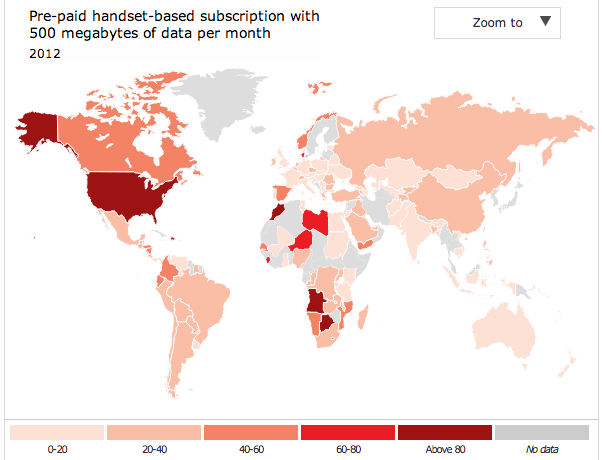U.S. wireless carriers are on track to earn more than $100 billion this year from usage-based billing plans for mobile data, the first country in the world to break the symbolic $100 billion mark in data revenue.
Analyst Chetan Sharma reports Verizon Wireless and AT&T are statistically the largest recipients of revenue earned from metering data usage. For the first time in 2013, mobile data revenue surpassed voice revenue in the U.S., making data usage the most lucrative product available from wireless carriers.
A graph from the Economist published last year explains the runaway revenue growth at U.S. wireless carriers. The lack of significant competition has allowed U.S. companies to charge an average of $85 a month for data plans, which are nearly always bundled into compulsory packages of unlimited voice calling and texting. In contrast, customers in China pay just $24 for data plans. In the United Kingdom, the average charge is $9 a month.
 Sharma said the only disruption to this revenue growth in the United States comes from T-Mobile USA, which has recently cut prices on its service plans, forcing AT&T and Verizon Wireless to react with moderate price cutting. But with the significant disparity in market share between AT&T and Verizon vs. T-Mobile, neither larger carrier is expected to take a significant hit to their bottom lines without a mass exodus to the country’s fourth largest provider.
Sharma said the only disruption to this revenue growth in the United States comes from T-Mobile USA, which has recently cut prices on its service plans, forcing AT&T and Verizon Wireless to react with moderate price cutting. But with the significant disparity in market share between AT&T and Verizon vs. T-Mobile, neither larger carrier is expected to take a significant hit to their bottom lines without a mass exodus to the country’s fourth largest provider.
Softbank, the Japanese company that now controls Sprint, has launched a lobbying effort to secure permission to acquire T-Mobile and merge it into the Sprint network. But with reports showing T-Mobile’s willingness to disrupt the wireless market, regulators are likely to be reluctant to remove that competition from the playing field.


 Subscribe
Subscribe
Phil, the biggest impacts of wireless caps is 1) driving people towards offload, which is great for the wifi vendor sector; and 2) monetize urban/suburban users demand in rural markets. The reason 3G was never built out widely in rural, post the 2G buildouts (which were necessary because we moved off hybrid digital/analog phones) was flat-rate all you can eat wireless plans. There was no way to monetize the urban user. They were pure cost in 3G enabled rural markets.